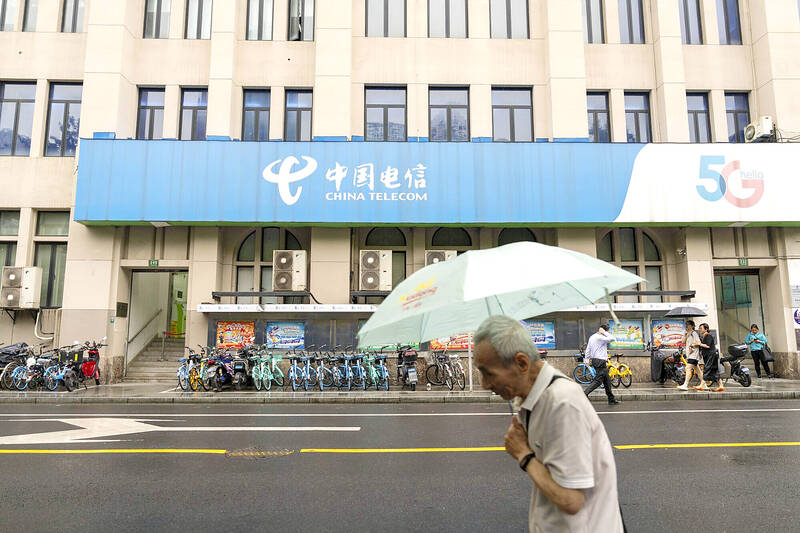US President Joe Biden’s administration is investigating China Mobile Ltd (中國移動), China Telecom Corp (中國電信) and China Unicom Hong Kong Ltd (中國聯通) over concerns the firms could exploit access to US data through their US cloud and Internet businesses by providing them to Beijing, three sources familiar with the matter said.
Authorities at the US Department of Commerce are running the investigation, which has not been previously reported. They have subpoenaed the state-backed companies and have completed “risk-based analyses” of China Mobile and China Telecom, but are not as advanced in their probe of China Unicom, the people said, declining to be named because the probe is not public.
The companies have long been in Washington’s crosshairs. The US Federal Communications Commission (FCC) denied China Mobile’s application to provide telephone service in 2019 and revoked China Telecom and China Unicom’s licenses to do the same in 2021 and 2022 respectively. In April, the FCC barred the companies from providing broadband service.

Photo: Bloomberg
The companies still have a small presence in the US, providing cloud services and routing wholesale US Internet traffic. That gives them access to US data even after telecom regulators barred them from providing telephone and retail Internet services in the nation.
The Chinese companies and their US-based lawyers did not respond to requests for comment. The US Department of Justice declined to comment and the White House referred questions to the commerce department, which declined to comment.
The Chinese embassy in Washington said it hopes the US would “stop suppressing Chinese companies under false pretexts,” adding that China would continue to defend the rights and interests of Chinese companies.
The investigation is the latest effort by Washington to prevent Beijing from exploiting Chinese firms’ access to US data to harm companies, Americans or national security, as part of a deepening tech war between the geopolitical rivals. It shows the administration is trying to shut down all remaining avenues for Chinese companies already targeted by Washington to obtain US data.
Regulators have not yet made decisions about how to address the potential threat, two of the people said.
However, equipped with the authority to probe Internet services sold into the US by companies from “foreign adversary” nations, regulators could block transactions allowing them to operate in data centers and route data for Internet providers, the sources said.
Blocking key transactions, in turn, could degrade the Chinese firms’ ability to offer competitive US-facing cloud and Internet services to global customers, crippling their remaining US businesses, experts and sources said.
The commerce department “must rigorously use its ... authorities to protect US data and infrastructure from Chinese companies like China Telecom,” US Representative and Committee on Foreign Affairs chairman Michael McCaul said in a statement.
“As one of our top adversaries, China cannot and should not ever be trusted to have access to Americans’ private data,” he added.

Taiwan Semiconductor Manufacturing Co (TSMC, 台積電) yesterday said that its investment plan in Arizona is going according to schedule, following a local media report claiming that the company is planning to break ground on its third wafer fab in the US in June. In a statement, TSMC said it does not comment on market speculation, but that its investments in Arizona are proceeding well. TSMC is investing more than US$65 billion in Arizona to build three advanced wafer fabs. The first one has started production using the 4-nanometer (nm) process, while the second one would start mass production using the

A TAIWAN DEAL: TSMC is in early talks to fully operate Intel’s US semiconductor factories in a deal first raised by Trump officials, but Intel’s interest is uncertain Broadcom Inc has had informal talks with its advisers about making a bid for Intel Corp’s chip-design and marketing business, the Wall Street Journal reported, citing people familiar with the matter. Nothing has been submitted to Intel and Broadcom could decide not to pursue a deal, according to the Journal. Bloomberg News earlier reported that Taiwan Semiconductor Manufacturing Co (TSMC, 台積電) is in early talks for a controlling stake in Intel’s factories at the request of officials at US President Donald Trump’s administration, as the president looks to boost US manufacturing and maintain the country’s leadership in critical technologies. Trump officials raised the

‘SILVER LINING’: Although the news caused TSMC to fall on the local market, an analyst said that as tariffs are not set to go into effect until April, there is still time for negotiations US President Donald Trump on Tuesday said that he would likely impose tariffs on semiconductor, automobile and pharmaceutical imports of about 25 percent, with an announcement coming as soon as April 2 in a move that would represent a dramatic widening of the US leader’s trade war. “I probably will tell you that on April 2, but it’ll be in the neighborhood of 25 percent,” Trump told reporters at his Mar-a-Lago club when asked about his plan for auto tariffs. Asked about similar levies on pharmaceutical drugs and semiconductors, the president said that “it’ll be 25 percent and higher, and it’ll

CHIP BOOM: Revenue for the semiconductor industry is set to reach US$1 trillion by 2032, opening up opportunities for the chip pacakging and testing company, it said ASE Technology Holding Co (日月光投控), the world’s largest provider of outsourced semiconductor assembly and test (OSAT) services, yesterday launched a new advanced manufacturing facility in Penang, Malaysia, aiming to meet growing demand for emerging technologies such as generative artificial intelligence (AI) applications. The US$300 million facility is a critical step in expanding ASE’s global footprint, offering an alternative for customers from the US, Europe, Japan, South Korea and China to assemble and test chips outside of Taiwan amid efforts to diversify supply chains. The plant, the company’s fifth in Malaysia, is part of a strategic expansion plan that would more than triple